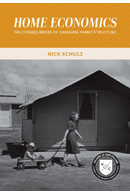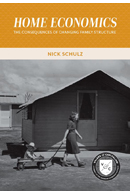Nick Schulz is frustrated. He’s frustrated that economists talk about the role of institutions in the American economy, yet ignore the most fundamental one of them all: the family. With a career built on writing about the roots of economic growth, Schulz has realized that you can’t understand today’s economy—from the need for human capital to rising inequality— without considering the platoons of moms, dads, and children that form the backbone of American society. And the situation is not pretty. The American family is in a state of crisis, which in turn is having a profound impact on the economy.
Yet too many experts remain silent for fear of becoming collateral damage in America’s culture wars. Nick Schulz wrote  Home Economics for these silent ones who have ignored the family’s role in the economy. He concludes as former Secretary of Education Bill Bennett did, finding that the “family is the original and best Department of Health, Education, and Welfare.”
Home Economics for these silent ones who have ignored the family’s role in the economy. He concludes as former Secretary of Education Bill Bennett did, finding that the “family is the original and best Department of Health, Education, and Welfare.”
Looking across 50 years of history, Schulz provides an introductory analysis of the forces buffeting the American family, but he doesn’t dwell on the root causes. They are far too complex, ranging from changes in technology, culture, habits, morality, religion, and economic forces, among others. The point is that America’s customs concerning the family and, more specifically, marriage, have shifted dramatically. Out-of-wedlock births are increasingly common, as are parents who never marry. For those who do walk down the aisle, they face long odds of remaining together “‘til death do us part.”
For those tempted to say, “So what?”, rising income inequality, wealth disparities, and disproportionate health outcomes are all impossible to understand without taking a hard look at families. As Jason DeParle wrote last year in The New York Times that “changes in marriage patterns — as opposed to changes in individual earnings — may account for as much as 40% of the growth in certain measures of inequality.” David Leonhardt, also of the Times, noted a recent finding that “family structure was one of the four factors with a clear relationship to upward mobility.” As Schulz himself found, only 5% of married families were poor at any point this year, while 30% of single-parent households felt the blow of poverty. These data points paint a bleak portrait; those being raised without a mother and a father will face immense social and economic barriers.
Login to read more
Sign in or create a free account to access Subscriber-only content.
